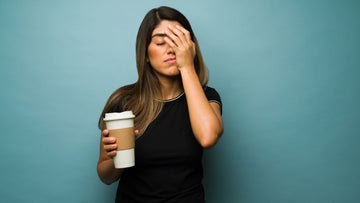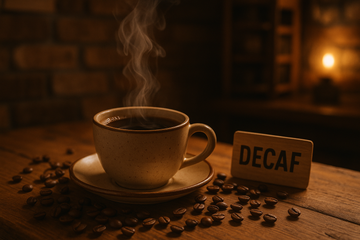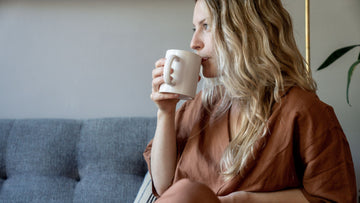
For millions of people, the first thing they reach for every morning is coffee — that steaming cup of energy, motivation, and focus. But if you’ve ever wondered why you still feel tired, foggy, or drained even after your daily caffeine fix, you’re not alone.
Coffee promises to wake us up — but for many, it’s doing the opposite.
☕ The Illusion of Energy
Caffeine doesn’t actually create energy; it simply tricks your brain into feeling awake. It does this by blocking a neurotransmitter called adenosine, which builds up in your body throughout the day to make you feel tired.
When caffeine blocks adenosine, your brain doesn’t register fatigue — so you feel alert. But the adenosine is still there, waiting. Once the caffeine wears off, that wave of tiredness comes crashing in — leading to the familiar caffeine crash.
It’s not real energy — it’s borrowed energy, and it always comes with interest.
💥 The Caffeine Crash Cycle
Here’s how the cycle works:
-
You drink coffee. Caffeine blocks adenosine, you feel alert.
-
Stress hormones rise. Caffeine triggers adrenaline and cortisol — your “fight-or-flight” response.
-
You burn through stored energy. Your body uses glycogen and blood sugar to keep up.
-
You crash. Adenosine floods back in, blood sugar drops, and you feel tired, anxious, or moody.
-
You reach for another coffee. And the cycle repeats.
Over time, this constant rollercoaster can leave your adrenal glands and nervous system depleted — leading to chronic fatigue, brain fog, and emotional burnout.
⚖️ Caffeine and Cortisol: The Stress Connection
Caffeine stimulates cortisol, your body’s primary stress hormone. While this can be helpful short-term (like before a big presentation), daily spikes keep your body in a constant state of “fight or flight.”
Chronically high cortisol can lead to:
-
Sleep disruption (trouble falling or staying asleep)
-
Weight gain (especially around the belly)
-
Hormonal imbalance
-
Irritability and mood swings
-
Fatigue despite “rest”
Essentially, caffeine pushes your body to perform — even when it’s asking for rest. That’s why you might feel “wired but tired” all the time.
🌙 Why Coffee Disrupts Your Sleep (Even Morning Coffee)
You might think your morning latte has no effect on your sleep — but caffeine can stay in your system for 8 to 12 hours.
That means your 10 a.m. cup could still be interfering with your ability to reach deep, restorative sleep at night.
Poor sleep leads to more fatigue, which leads to more coffee — and the exhaustion loop continues.
According to a study published in Sleep Medicine Reviews, caffeine consumed even six hours before bedtime can reduce total sleep time and quality significantly (Drake et al., 2013).
💢 The Blood Sugar Rollercoaster
Caffeine also increases the release of adrenaline and glucose (sugar) into your bloodstream. This gives you that instant rush of energy — but it’s followed by a rapid drop in blood sugar, leading to:
-
Mid-morning crashes
-
Cravings for sugar or carbs
-
Shakiness or irritability (“hangry” feelings)
-
Afternoon slumps
For women, these fluctuations can also impact hormones like estrogen and progesterone, worsening PMS, bloating, and fatigue.
🌸 The Hormone Factor
Women metabolize caffeine differently to men — especially due to hormonal changes throughout the menstrual cycle, pregnancy, or menopause.
In the luteal phase (the week or so before your period), caffeine stays in your system longer. This means higher chances of:
-
Jitters
-
Anxiety
-
Breast tenderness
-
Sleep disturbances
If you have thyroid issues, PCOS, or are navigating perimenopause, caffeine can amplify those symptoms by increasing cortisol and disrupting hormonal balance.
So while coffee gives the illusion of energy, for many women, it’s actually draining the very systems that regulate energy, mood, and hormones.
🧠 How Going Caffeine-Free Restores Natural Energy
When you reduce or eliminate caffeine, your body starts to rebalance:
-
Adenosine sensitivity resets, so your sleep-wake cycle normalizes.
-
Cortisol stabilizes, helping you wake up naturally without stress spikes.
-
Energy feels steadier throughout the day, not spiky or crash-prone.
-
Better hydration and nutrient absorption improve skin, digestion, and mental clarity.
Within a few weeks, many people report waking up easier, feeling calmer, and no longer needing caffeine to function.
🌿 Replacing the Ritual, Not the Rush
The hardest part of quitting coffee isn’t the caffeine — it’s the ritual. That quiet morning moment, that first sip, that smell — it’s emotional.
That’s exactly why Not Coffee was created.
Made from roasted chicory root, organic carob, and roasted chickpea, Not Coffee was designed to:
-
Look, act, and taste like coffee
-
Be completely caffeine- and stimulant-free
-
Support digestion and gut health
-
Be gentle on hormones and the nervous system
Whether you drink it black, as a latte, or iced, it allows you to keep the comforting coffee ritual — minus the side effects.
⚡ Relearning What True Energy Feels Like
True energy isn’t a jolt; it’s a flow.
When you stop relying on caffeine, you begin to rediscover what it feels like to have consistent, grounded energy — the kind that comes from balanced hormones, deep sleep, and nourished adrenals.
Instead of chasing the next cup, your body starts working with you again — not against you.
💛 The Takeaway
If you’re feeling exhausted even after your morning coffee, your body isn’t broken — it’s sending you a message.
Caffeine masks fatigue, but it doesn’t solve it. And for many women, it may actually be part of the problem.
Switching to a caffeine-free alternative like Not Coffee can help you break the cycle, restore your natural energy, and bring balance back to your body — one cup at a time.
References
-
Drake, C. L., Roehrs, T., Shambroom, J., & Roth, T. (2013). Caffeine effects on sleep taken 0, 3, or 6 hours before going to bed. Sleep Medicine Reviews.
-
Smith, A. (2002). Effects of caffeine on human behavior. Food and Chemical Toxicology, 40(9), 1243–1255.
-
Lovallo, W. R. (2006). Caffeine and stress: Implications for risk, anxiety, and depression. Journal of Psychopharmacology, 20(4), 494–502.




